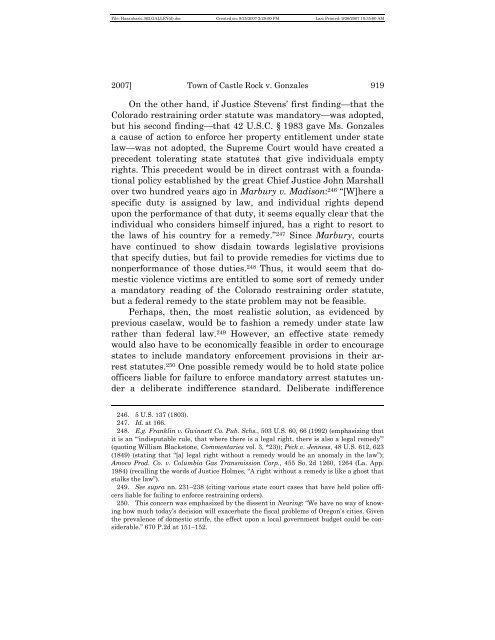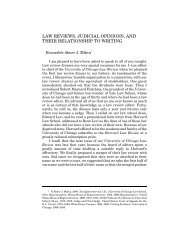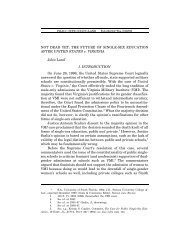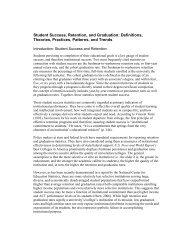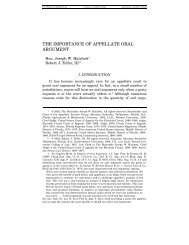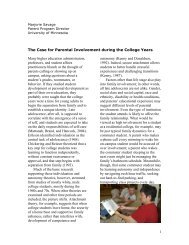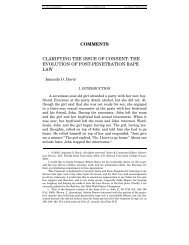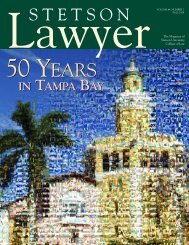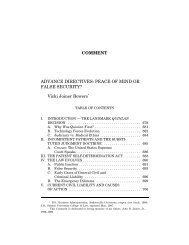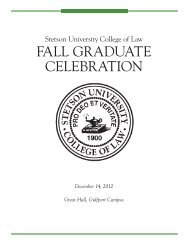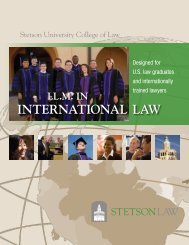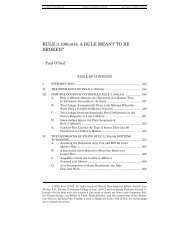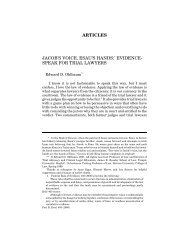TOWN OF CASTLE ROCK v. GONZALES: THE ... - Stetson University
TOWN OF CASTLE ROCK v. GONZALES: THE ... - Stetson University
TOWN OF CASTLE ROCK v. GONZALES: THE ... - Stetson University
You also want an ePaper? Increase the reach of your titles
YUMPU automatically turns print PDFs into web optimized ePapers that Google loves.
File: Hasanbasic.362.GALLEY(d).doc Created on: 9/25/2007 2:29:00 PM Last Printed: 9/26/2007 10:35:00 AM2007] Town of Castle Rock v. Gonzales 919On the other hand, if Justice Stevens’ first finding—that theColorado restraining order statute was mandatory—was adopted,but his second finding—that 42 U.S.C. § 1983 gave Ms. Gonzalesa cause of action to enforce her property entitlement under statelaw—was not adopted, the Supreme Court would have created aprecedent tolerating state statutes that give individuals emptyrights. This precedent would be in direct contrast with a foundationalpolicy established by the great Chief Justice John Marshallover two hundred years ago in Marbury v. Madison: 246 “[W]here aspecific duty is assigned by law, and individual rights dependupon the performance of that duty, it seems equally clear that theindividual who considers himself injured, has a right to resort tothe laws of his country for a remedy.” 247 Since Marbury, courtshave continued to show disdain towards legislative provisionsthat specify duties, but fail to provide remedies for victims due tononperformance of those duties. 248 Thus, it would seem that domesticviolence victims are entitled to some sort of remedy undera mandatory reading of the Colorado restraining order statute,but a federal remedy to the state problem may not be feasible.Perhaps, then, the most realistic solution, as evidenced byprevious caselaw, would be to fashion a remedy under state lawrather than federal law. 249 However, an effective state remedywould also have to be economically feasible in order to encouragestates to include mandatory enforcement provisions in their arreststatutes. 250 One possible remedy would be to hold state policeofficers liable for failure to enforce mandatory arrest statutes undera deliberate indifference standard. Deliberate indifference246. 5 U.S. 137 (1803).247. Id. at 166.248. E.g. Franklin v. Gwinnett Co. Pub. Schs., 503 U.S. 60, 66 (1992) (emphasizing thatit is an “‘indisputable rule, that where there is a legal right, there is also a legal remedy’”(quoting William Blackstone, Commentaries vol. 3, *23)); Peck v. Jenness, 48 U.S. 612, 623(1849) (stating that “[a] legal right without a remedy would be an anomaly in the law”);Amoco Prod. Co. v. Columbia Gas Transmission Corp., 455 So. 2d 1260, 1264 (La. App.1984) (recalling the words of Justice Holmes, “A right without a remedy is like a ghost thatstalks the law”).249. See supra nn. 231–238 (citing various state court cases that have held police officersliable for failing to enforce restraining orders).250. This concern was emphasized by the dissent in Nearing: “We have no way of knowinghow much today’s decision will exacerbate the fiscal problems of Oregon’s cities. Giventhe prevalence of domestic strife, the effect upon a local government budget could be considerable.”670 P.2d at 151–152.


